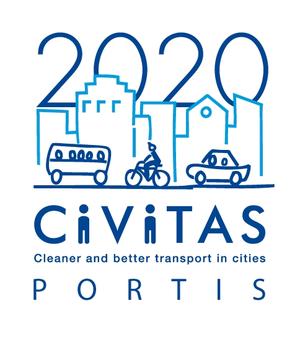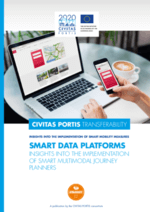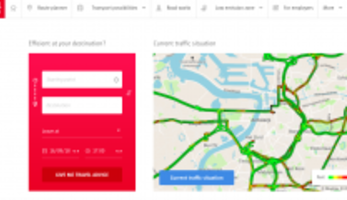PORTIS
CIVITAS PORTIS showed how sustainable mobility can create healthy and accessible city-port environments and resolve potential conflicts between freight, passenger and non-motorised transport in the process.

About the project
CIVITAS PORTIS designed, demonstrated, and evaluated innovative sustainable mobility measures in five European port cities: Aberdeen, (UK), Antwerp (Belgium), Constanta (Romania), Klaipeda (Lithuania), and Trieste (Italy). The project also had a major international ‘follower’ in the port city of Ningbo (China).
PORTIS set out to show how sustainable mobility can increase functional and social cohesion between city centres and ports, whilst driving economic growth and making urban environments more attractive. It did this by implementing a total of 49 measures - collected in a variety of packages - that addressed four main themes.
Governance
PORTIS facilitated collaboration between port authorities and municipalities by creating the governance structures needed for coordinated mobility and land-use planning. The main way of enabling this collaboration was the establishment of cooperation platforms.
These formed part of wider participatory decision-making processes involving all vital stakeholders within a city, including politicians, port actors, businesses and the wider public, as well as national government. In some cities, enhanced SUMPs resulted from this improved planning and participation.
People
To encourage people to adopt more car-independent lifestyles, PORTIS improved access to and the attractiveness of collective and active transport (including shared mobility), promoted the value of sustainable mobility, and allocated road space in a less car-centric way.
Hard measures that enhanced travel options through improved infrastructure and new services went hand in hand with soft measures designed to nudge people towards using these alternatives. To inform measure delivery, PORTIS collected data on user needs, demands and gaps in supply.
Transport systems
These measures integrated transport infrastructure and mobility systems. By using Intelligent Transport Systems and developing new data and IT solutions, road traffic movement and management became more efficient, public transport reliability increased, and information provision and signage improved. These resulted in reduced commuting times and better connectivity.
PORTIS cities also used the enhanced understanding of parking’s impact on traffic flows and parking capacity that their data solutions provided them with to update parking management plans and strategies. In parallel to this, some cities took steps to support and boost the use of electric vehicles.
Freight
Goods vehicles are a major cause of congestion and emissions in port cities. PORTIS optimised city-port freight flows through the application of smart plans and tools. Regulating access to the port area, new distribution plans, and coordinating freight movements using technological solutions reduced the environmental footprint and congestion resulting from freight movements within cities and between them and their ports.
In addition, PORTIS cities made urban freight more (energy) efficient by minimising large goods vehicle in city centres, analysing traffic data to find the quickest new routes for these vehicles, and adding clean vehicles to municipal fleets.
Website Facebook Klaipėda Facebook Constanta Facebook Trieste
Fast Facts
September 2016 - November 2020
Project duration
32 partners
Project partners
€ 17,678,40
Project funding
50 measures
Implemented measures
Latest
Knowledge Bank
Multimedia Library
This is recommended related external content and can be viewed by clicking on it. By clicking you consent to the display of external content. This enables personal data to be transmitted to third-party platforms.
Read more about our privacy policy.
This is recommended related external content and can be viewed by clicking on it. By clicking you consent to the display of external content. This enables personal data to be transmitted to third-party platforms.
Read more about our privacy policy.
This is recommended related external content and can be viewed by clicking on it. By clicking you consent to the display of external content. This enables personal data to be transmitted to third-party platforms.
Read more about our privacy policy.
This is recommended related external content and can be viewed by clicking on it. By clicking you consent to the display of external content. This enables personal data to be transmitted to third-party platforms.
Read more about our privacy policy.
Mobility solutions
Contacts
Marjolein Salens
Assistant Project Coordinator
Marjolein.Salens [at] stad.Antwerpen.be
Ingrid Briesner
Dissemination Manager
briesner [at] fgm.at
Silvia Gaggi
Project Manager
sgaggi [at] isinnova.org
Marijke De Roeck
Project Coordinator
Marijke.DeRoeck [at] stad.Antwerpen.be

































